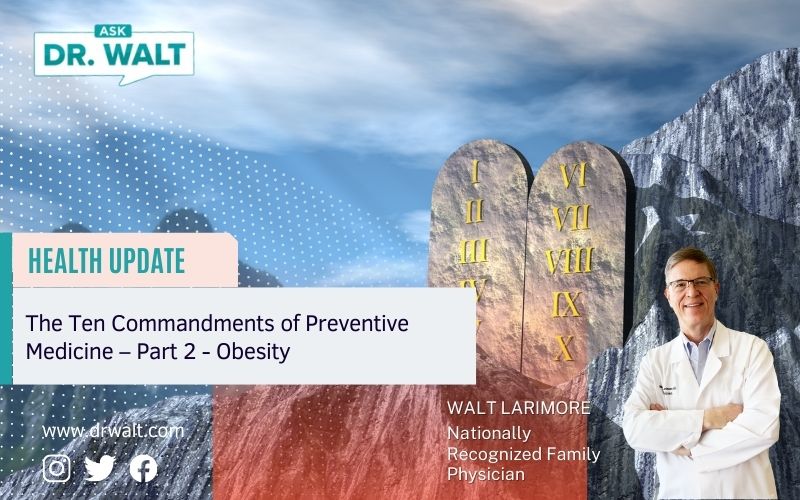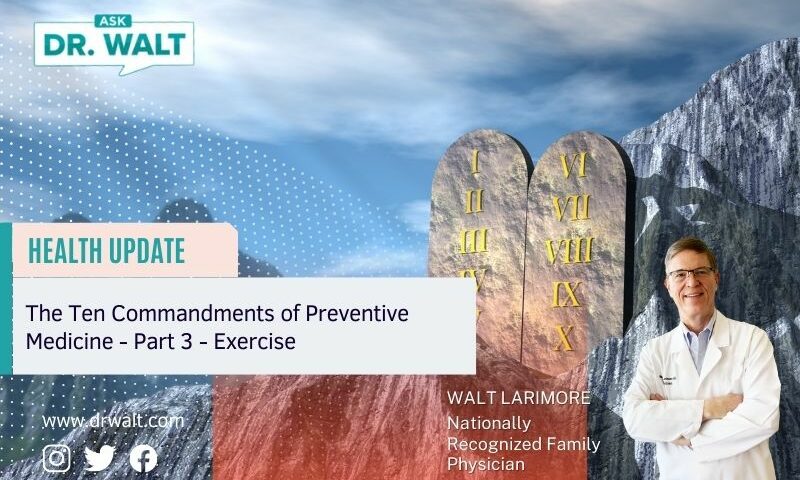
The Ten Commandments of Preventive Medicine – Part 2 – Obesity
January 7, 2023
The Ten Commandments of Preventive Medicine – Part 4 – Marriage
January 9, 2023In my newest book, 10 Essentials of Happy, Healthy People, I teach people how to utilize ten essentials that are necessary to live a happy and highly healthy life. Under The Essential of Self-Care, I teach what I call “The 10 Commandments of Preventive Medicine.” Here’s the third installment of this ten-part series.
These “Ten Commandments,” which I’ve long suggested to my patients and to my radio and television audiences, target exclusively the physical wheel. I suspect we could identify several more commandments related to preventing disease, but these are an excellent start.
Commandment #3 = Exercise Regularly
As you probably are well aware, dietary and nutrition changes, in and of themselves, almost never translate to significant weight loss. In order to achieve and maintain an ideal body weight and to become a highly healthy person, you simply must exercise.
People who exercise frequently, even if it’s weeding in the garden or walking around the block, enjoy better overall health—physically and emotionally. Not only that, exercise may also assist you in controlling what you eat.
In other words, exercise and good nutrition can help each other help you.
People who exercise at least three hours a week tend to eat a more balanced and a healthier diet, one research study found. The researchers gave several reasons for their findings:
- People who exercise think twice before overindulging. When I would explain to my patients that eating the average meal at a fast-food restaurant would require a one- to two-hour walk to work off the calories, they sometimes found it easier to “just say no.”
- The more you exercise, the more you can eat. Research from the U.S. Department of Agriculture has shown that the vast majority of people (though not all) can lose weight if they simply consume fewer than 1,500 calories per day. If you’re exercising regularly, then you could take in 1,700 to 1,800 calories a day and achieve the same effect. If you eat fewer than 1,500 calories a day andexercise daily, then you will almost certainly lose weight and keep it off.
- Exercise makes you feel healthier than eating does. Once people begin to eat better and exercise daily, they notice remarkably bad feelings when they revert to old habits.
Most of my patients who began to exercise boasted of improved skin health, increased stamina and work performance, increased energy, more restful sleep, and an improved sex life. You won’t get that from a fad diet!
My daughter, Kate, cut out all beverages except for tea and water while in college. “Dad,” she told me, “I can’t believe how sweetsoft drinks taste now.”
Many people will notice that desserts or red meats make them feel sluggish after they’ve stopped consuming them for a period of time.
Regular exercise will help you control your weight, improve your overall health, and reduce your risk of such medical problems as diabetes, heart disease, and osteoporosis. According to the Centers for Disease Control, we should exercise for thirty to sixty minutes three to five days per week. The CDC reports that fewer than one-third of all Americans exercise this much.
“This is probably the most sedentary generation of people in the history of the world,” America’s Surgeon General has written. The National Academy of Sciences’ Institute of Medicine issued a report containing this recommendation: “To maintain cardiovascular health at a maximal level, regardless of weight, adults and children also should spend a total of at least one hour each day in moderately intense physical activity.”
What if you can’t (or won’t) exercise this much?
It is clear from the medical studies that any exercise is better than none.
Your fitness level, which can be determined by a cardiac stress test, may be the single best predictor of your risk of dying prematurely—whether or not you have a diagnosed heart disease, suggests an extensive study of more than 6,000 men over the course of more than six years.
Besides predicting the presence of heart disease, a cardiac stress test evaluates your fitness—and routinely reports this as an exercise capacity or fitness level (which the doctors call aerobic capacity). This level is expressed in units called METS—metabolic equivalents.
In this study, men with a fitness level of five METS or fewer had twice the chance of dying as people with a METS level of eight or more—whether they had heart disease or not. In other words, exercise and aerobic fitness are strongly associated with a longer and more highly healthy life.
In the past, the cardiac stress test was used primarily for testing the level of disease of the heart. However, this study shows that this exercise test can now be used to test wellness and to predict overall health risk.
Many who begin to exercise develop a common problem: They quit! And pretty quickly, according to sports psychologist William F. Morgan of the University of Wisconsin-Madison. Within six to eight weeks, 50 percent have quit exercising; another 25 percent quit by the end of one year.
His research shows that the approach of joining a health club, doing weight training, running, and the like doesn’t motivate most people. He believes that people do not need exercise programsas much as they just need physical activity that is part of their daily lives and has some sense of purpose.
Dr. Morgan notes that one of the best exercise machines available is the family dog—it has to go on its daily walk, with its owner in tow.
Similarly, people who walk to work (by parking a considerable distance from the building) and who take the stairs (rather than the elevator) will get healthful activity, even though they may not think of it as exercise.
Setting a goal when exercising—to lose weight, to avoid weakening of the bones, to add a bit to one’s life span—can impart much personal meaning to physical activity. However, the challenge is to overcome the initial tedium and discomfort in order to get to the point where the benefits kick in.
The best thing to do? Minimize the discomfort and accentuate the enjoyment of the activity.
I recommend that you find an activity you like and that you do it with a person you like, and then that you keep doing it regularly until it becomes a habit. Getting support from a small group of friends or colleagues can provide the meaning that will be transformed into motivation to continue exercising.
Beginning exercisers are less likely to drop out if they think they will lose face in their group or will let down other members by not showing up.
Accountability counts!
Some people do best with a personal trainer. My wife, Barb, and several of her friends hired a personal trainer to work with them at a gym three days a week. The trainer helped them keep their goals positive and aligned with reality. She taught them wise and valuable workout techniques that matched their physiques and personalities. The trainer helped build their confidence as a group by targeting small but achievable increases and discouraging lofty goals that would have been tough to achieve. Splitting the cost with several others also made it very affordable!
Follow these steps to success in beginning and then continuing to exercise as a natural part of your lifestyle:
- Get started—don’t delay.
- Pick a form (or forms) of exercise that you enjoy. (Or at the very least, do something else that you enjoy as you exercise. Walking on a treadmill may become more enjoyable if you can read while walking.)
- Exercise with a partner or a group.
Be sure to take all the safety precautions recommended for the activities you choose. Wearing a helmet while cycling, skiing, or skating can reduce your risk of head injury by 85 percent. Other safety equipment (such as knee pads and wrist guards) also reduces your risk of injury when you are roller-blading.
Although exercise is beneficial for almost everyone, some people need to consult a doctor to find out what level and types of physical activities are safe for them.
This precaution is especially important for pregnant women, people who have a medical condition that might be aggravated by exercise (such as diabetes, arthritis, or angina), and people who are taking any type of medication (especially medicines for high blood pressure or heart disease).
You may not find a lot of surprises here—but the real questions are these:
- Which of these rules do you need to begin to follow?
- When do you plan to start?
- What strategies will ensure your success?
- By beginning with a single step and then continuing to improve on a day-to-day basis, you’ll be on your way to becoming a happier and more highly healthy person.
Here are all 10 of the Preventive Medicine Commandments:
- The Ten Commandments of Preventive Medicine – Part 1 – Primary Care
- The Ten Commandments of Preventive Medicine – Part 2 – Obesity
- The Ten Commandments of Preventive Medicine – Part 3 – Exercise
- The Ten Commandments of Preventive Medicine – Part 4 – Marriage
- The Ten Commandments of Preventive Medicine – Part 5 – Dental Health
- The Ten Commandments of Preventive Medicine – Part 6 – Alcohol
- The Ten Commandments of Preventive Medicine – Part 7 – Tobacco
- The Ten Commandments of Preventive Medicine – Part 8 – Alternative Medicine
- The Ten Commandments of Preventive Medicine – Part 9 – Automobile Safety Devices
- The Ten Commandments of Preventive Medicine – Part 10 – Smoke and CO Detectors
And, here are all 10 of the essentials that can be found in my book, 10 Essentials of Happy, Healthy People:
- Set a Wise Balance in Your Life – The Essential of Balance
- Be Proactive in Preventing Disease – The Essential of Self-Care
- Practice Acceptance and Letting Go – The Essential of Forgiveness
- Lighten Your Load – The Essential of Reducing SADness (Stress, Anxiety, and Depression)
- Avoid Loneliness Like the Plague – The Essential of Healthy Relationships
- Cultivate a True Spirituality – The Essential of Spiritual Well-Being
- See Yourself as Your Creator Sees You – The Essential of a Positive Self-Image
- Nurture Your Hopes and Dreams – The Essential of Discovering Your Destiny
- Be Your Own Health Care Quarterback – The Essential of Personal Responsibility and Empowerment
- Team Up with Winning Health Care Providers – The Essential of Teamwork
You can learn more about these in my book, 10 Essentials of Happy, Healthy People. You can order an autographed copy here.




